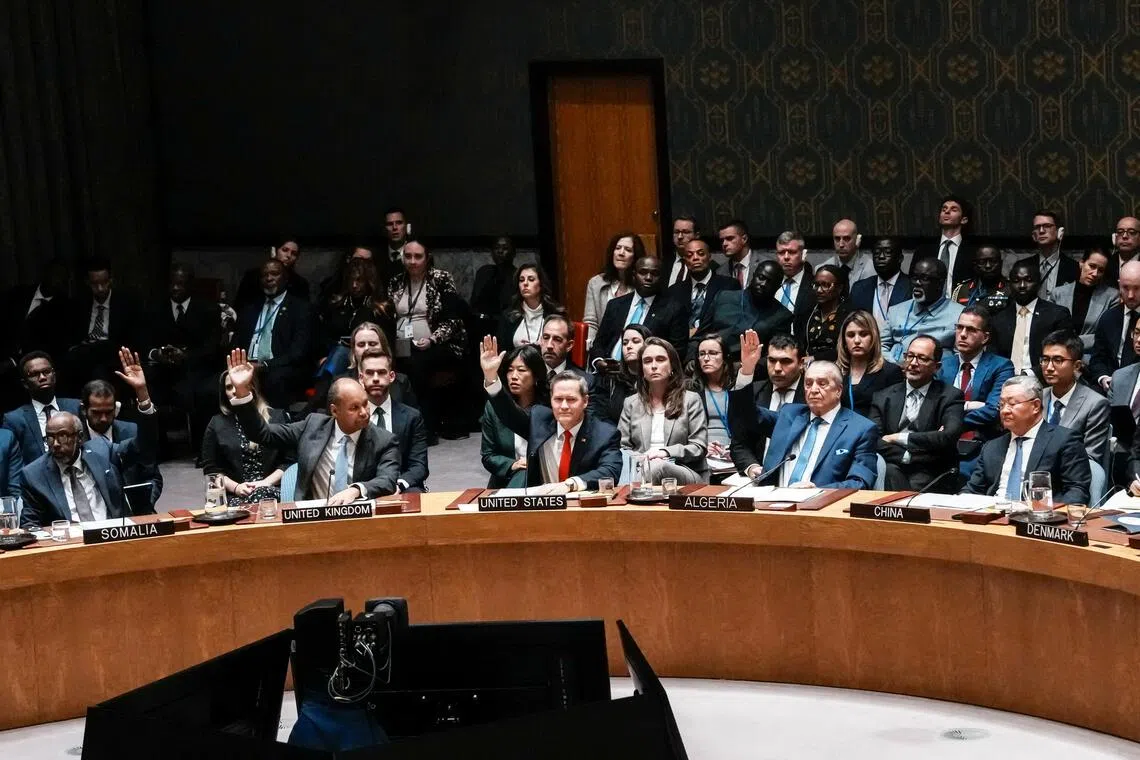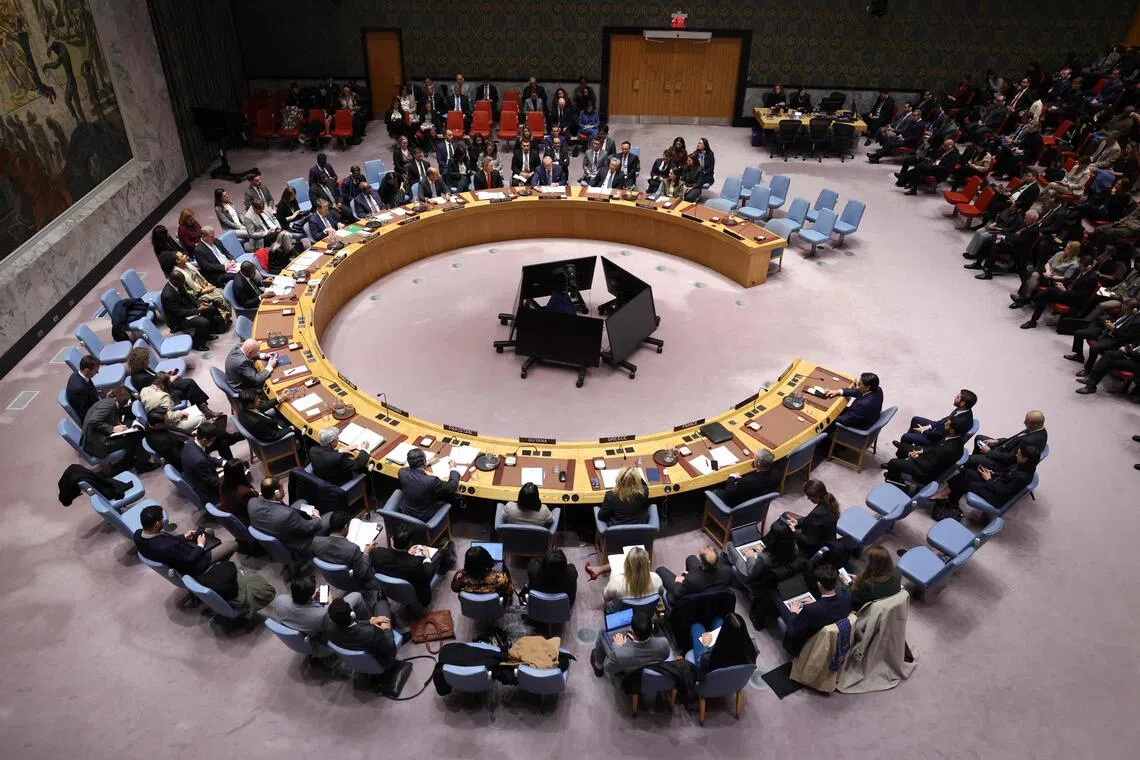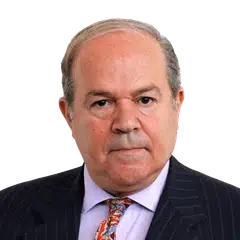News analysis
Historic UN resolution accords legitimacy to Trump’s Gaza peace plan. Now for the tough part
Sign up now: Get ST's newsletters delivered to your inbox

US Ambassador to the UN Michael Waltz and other ambassadors voting during a Nov 17 meeting to establish an International Stabilisation Force in Gaza.
PHOTO: REUTERS
LONDON – US President Donald Trump has often dismissed the United Nations as a “useless” organisation, powerless to tackle the world’s conflicts.
Yet, during the early hours of Nov 18 and soon after the UN Security Council voted in favour of a US-drafted resolution that endorses his plan for peace in Gaza,
This is, of course, a typical Trump exaggeration. Far from being a coherent document, the plan approved by the Security Council is just a list of sketchy promises about the reconstruction and future administration of Gaza.
Nor does Mr Trump see the council as having much of a say in the fate of the Palestinians; in the US President’s vision, the UN is not an actor but just a stage for diplomatic manoeuvring.
Nonetheless, the council’s resolution is an important step in handling the Gaza crisis, for it gives the US plan for the post-war order in the Gaza Strip a basis under international law. And it offers the only reliable guide into the region’s future.
The initial phase of the plan – a ceasefire between Israel and Hamas, the Palestinian radical organisation in charge of Gaza, and the subsequent exchange of hostages and detainees between the two of them – came into force on Oct 10.
The ceasefire is still holding, although as US Ambassador to the UN Mike Waltz readily admitted, this remains just a “fragile first step”.
The key next stage is the establishment of an International Stabilisation Force (ISF) to be deployed to the territory, with the task of “supporting the demilitarisation of Gaza” and “ensuring the safety of Palestinian civilians”, as Mr Waltz put it.
This should be followed by the creation of a so-called Board of Peace (BoP) to serve as the overall authority ensuring Gaza’s administration, civilian aid procedures and future reconstruction efforts.

The UN Security Council voted on Nov 17 in favour of a US-drafted resolution that endorses Mr Donald Trump's plan for peace in Gaza.
PHOTO: AFP
President Trump, who included the ISF and BoP in his 20-point plan for Gaza, did not initially believe that either body needed international approval. But he was quickly persuaded that no country would commit its troops and financial resources without the UN’s formal endorsement.
The UN Security Council has now provided this endorsement. Yet, apart from the near certainty that a US military commander will be in charge of the ISF and that Mr Trump will chair the BoP, little is known about the composition or method of operation of either body.
A US-led military planning cell has operated in Israel for weeks, working out the details of a future ISF deployment in Gaza.
What has emerged clearly from its analysis is that, if it is to be effective in both disarming Hamas and ensuring local safety, the ISF should be pretty significant – perhaps comprising about 20,000 troops – and should be mainly composed of soldiers from Arab and Muslim countries, to more likely be acceptable to the local population.
Along with the US, Egypt, Turkey and Qatar are leading discussions on the creation of the ISF. In theory, this is a perfect choice. As the region’s biggest states, Egypt and Turkey have large standing armies and can deploy plenty of soldiers. Meanwhile, Qatar’s deep pockets can easily bankroll such a deployment.
In practice, however, matters are not so simple. The arrival of troops from Egypt, which is Gaza’s only immediate Arab neighbour, will be controversial, especially since the Egyptian government has always viewed Hamas as a threat.
The potential deployment of Turkish troops as part of the ISF may reassure Hamas, since Turkish President Recep Tayyip Erdogan has close contacts with this radical Palestinian organisation. Yet precisely because of this, Israel strenuously objects to a prominent Turkish presence in Gaza.
The obvious solution may be to invite other Muslim nations outside the Middle East to contribute troops to the ISF; Indonesia, Malaysia and Pakistan are frequently mentioned in this context.
But many Arab leaders are privately voicing their disquiet at the potential arrival of soldiers who speak no Arabic and have little grasp of the local circumstances.
Nor is it clear how the ISF, once deployed, will interact with Israel, whose troops remain in control of about half of Gaza’s territory.
The Trump plan, as now endorsed by the Security Council, calls for the complete withdrawal of Israel from the Strip.
However, no timetable for this withdrawal exists, and rumours circulating in the region suggest that the US plans to start the construction of new housing for displaced Palestinians in the Israeli-controlled part of Gaza, mainly because this is now sparsely populated and more secure.
If such rumours prove to be true, Gaza may remain divided for years. And this may be precisely what Israeli Prime Minister Benjamin Netanyahu is hoping for.
The Arab and Muslim states that supported this week’s UN Security Council vote take some comfort from the fact that the resolution promises a credible pathway to Palestinian self-determination and, eventually, a Palestinian independent state.
This is the sort of language many Security Council members pushed for, and a pledge UN Secretary-General Antonio Guterres considers as the key achievement of the current effort.
The urgent task now is to create “a political process for the achievement of the two-state solution”, a spokesman for Mr Guterres said after the adoption of the latest resolution.
However, the promise that the stabilisation of Gaza will be a stepping stone to Palestinian freedom remains hopelessly vague. There is no mention in the UN resolution of the West Bank, where Israeli settlers are currently engaged in a violent rampage against local Palestinian inhabitants.
And although the Palestinian Authority, the moderate entity recognised by the international community as the legal representative of the Palestinian nation, has expressed its willingness to take over the administration of Gaza, the authority’s 90-year-old leader Mahmoud Abbas is hardly the sort of inspirational leader the war-torn territory desperately needs.
What can be said with certainty, however, is that regardless of its obvious flaws and glaring omissions, Mr Trump’s plan remains the only basis for handling the Gaza conflict.
The US now enjoys unrivalled influence, with the UN’s seal of approval. And this is, indeed, historic.
Jonathan Eyal is based in London and Brussels and writes on global political and security matters.



